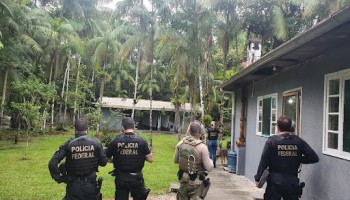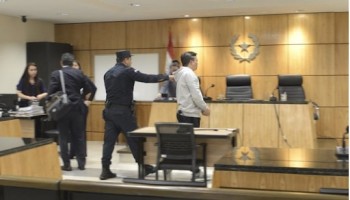Under the cover of darkness on Friday night, a police raid carried out in the northeastern province of Misiones, which is believed to be the main gateway for drugs coming from Paraguay, resulted in the seizure of over 120 kilos of cannabis, according to a government statement.
Misiones is unique given that it’s one of only two provinces in Argentina to share a border with both Paraguay and Brazil. This makes it an especially prevalent vector for cartel activity.
Argentine National Gendarmerie (GNA) officers discovered the traffickers’ position after sighting suspicious activity off the highway, just outside of Cerro Cora, a town close to both borders.
The suspects fled into the vegetation and a subsequent search of the area led to the discovery of the drugs in six burlap bags and a backpack.
Meanwhile, in a separate GNA operation, an organized series of raids across Salta and Buenos Aires resulted in the seizure of 21 kilos of cocaine, along with three suspects taken into custody.
What started as a surveillance operation led to the detection of a narco-trafficker vehicle along National Route 81, just south of the Paraguayan border.
Officers found drugs packaged in rectangular containers and hidden in a false bottom. From the information acquired during the seizure, search warrants were issued for areas of interest in Salta and Buenos Aires, where police eventually seized several weapons, vehicles, and communication and storage devices believed to have been used by the cartel.
Argentina is particularly susceptible to drug trafficking given its placement along the Triple Frontier, a tri-border junction shared with Paraguay and Brazil.
Its placement near countries known for cocaine production such as Peru and Bolivia, combined with strong trade ties throughout Europe, means that Argentina has become an attractive vector from which to traffic and launch Andean drugs into international markets, according to InSight Crime.
Marijuana and cocaine are trafficked by land, air, and sea throughout the country. The Paraná River is attached to the tip of more than 5,300 km of Argentinian coastline along the Atlantic. This gives cartels access to land routes further inland and into Paraguay.
Salta has been seen as the principle entry point for cocaine into Argentina, thanks to a nearby land border with Bolivia to the north. The city is also where the Castedo Clan, one of the country’s most influential cartels, is based.
The Castedo Clan allegedly transports Bolivian cocaine and as shipments are received, they are guarded in Orán until a stockpile of at least 500kg is achieved. It is then apparently sent along several highways en route to sea ports, from which it is shipped to Europe.
Misiones, meanwhile, is the principle gateway for Paraguayan marijuana into Argentina, via the Paraná River. InSight Crime attributes Misiones as the initial entry point for 60% of all cannabis seized in Argentina.
The scope of the market is a significant incentive for those transporting the drugs themselves. Up to 30 million Argentine Pesos (roughly US$310,000) can be made by drivers and intermediaries transporting drugs through the province, according to InSight Crime.






